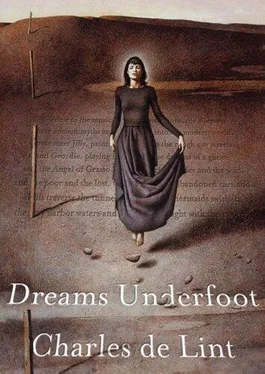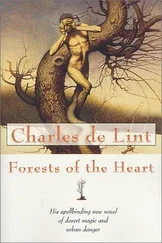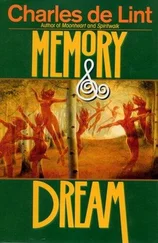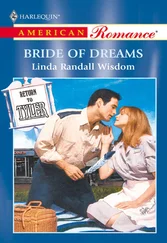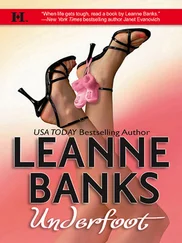She calls herself Tallulah, but I know who she really is. A name can’t begin to encompass the sum of all her parts. But that’s the magic of names, isn’t it? That the complex, contradictory individuals we are can be called up complete and whole in another mind through the simple sorcery of a name. And connected to the complete person we call up in our mind with the alchemy of their name comes all the baggage of memory: times you were together, the music you listened to this morning or that night, conversation and jokes and private moments—all the good and bad times you’ve shared.
Tally’s name conjures up more than just that for me. When the grisgris of the memories that hold her stir in my mind, she guides me through the city’s night like a totem does a shaman through Dreamtime. Everything familiar is changed; what she shows me goes under the skin, right to the marrow of the bone. I see a building and I know not only its shape and form, but its history. I can hear its breathing, I can almost read its thoughts.
It’s the same for a street or a park, an abandoned car or some secret garden hidden behind a wall, a late night cafe or an empty lot. Each one has its story, its secret history, and Tally taught me how to read each one of them. Where once I guessed at those stories, chasing rumors of them like they were errant fireflies, now I know.
I’m not as good with people. Neither of us are. Tally, at least, has an excuse. But me ...
I wish I’d never met her.
My brother Geordie is a busker—a street musician. He plays his fiddle on street corners or along the queues in the theatre district and makes a kind of magic with his music that words just can’t describe.
Listening to him play is like stepping into an old Irish or Scottish fairy tale. The slow airs call up haunted moors and lonely coastlines; the jigs and reels wake a fire in the soul that burns with the awesome wonder of bright stars on a cold night, or the familiar warmth of red coals glimmering in a friendly hearth.
The funny thing is, he’s one of the most pragmatic people I know. For all the enchantment he can call up out of that old Czech fiddle of his, I’m the one with the fey streak in our family.
As far as I’m concerned, the only difference between fact and what most people call fiction is about fifteen pages in the dictionary. I’ve got such an open mind that Geordie says I’ve got a hole in it, but I’ve been that way for as long as I can remember. It’s not so much that I’m gullible—though I’ve been called that and less charitable things in my time; it’s more that I’m willing to just suspend my disbelief until whatever I’m considering has been thoroughly debunked to my satisfaction.
I first started collecting oddities and curiosities as I heard about them when I was in my teens, filling page after page of spiralbound notebooks with little notes and jottings—neat inky scratches on the paper, each entry opening worlds of possibility for me whenever I reread them. I liked things to do with the city the best because that seemed the last place in the world where the delicate wonders that are magic should exist.
Truth to tell, a lot of what showed up in those notebooks leaned towards a darker side of the coin, but even that darkness had a light in it for me because it still stretched the realms of what was into a thousand variable whatmight-be’s. That was the real magic for me: the possibility that we only have to draw aside a veil to find the world a far more strange and wondrous place than its mundaneness allowed it could be.
It was my girlfriend back then—Katie Deren—who first con—
vinced me to use my notebooks as the basis for stories. Katie was about as odd a bird as I was in those days. We’d sit around with the music of obscure groups like the Incredible String Band or Dr.
Strangely Strange playing on the turntable and literally talk away whole nights about anything and everything. She had the strangest way of looking at things; everything had a soul for her, be it the majestic old oak tree that stood in her parents’ back yard, or the old black iron kettle that she kept filled with dried weeds on the sill of her bedroom window.
We drifted apart, the way it happens with a lot of relationships at that age, but I kept the gift she’d woken in me: the stories.
I never expected to become a writer, but then I had no real expectations whatsoever as to what I was going to be when I “grew up.” Sometimes I think I never did—grow up that is.
But I did get older. And I found I could make a living with my stories. I called them urban legends—independently of Jan Harold Brunvand, who also makes a living collecting them. But he approaches them as a folklorist, cataloguing and comparing them, while I retell them in stories that I sell to magazines and then recycle into book collections.
I don’t feel we’re in any kind of competition with each other, but then I feel that way about all writers. There are as many stories to be told as there are people to tell them about; only the meanspirited would consider there to be a competition at all. And Brunvand does such a wonderful job.
The first time I read his The Vanishing Hitchhiker, I was completely smitten with his work and, like the hundreds of other correspondents Brunvand has, made a point of sending him items I thought he could use for his future books.
But I never wrote to him about Tally.
I do my writing at night—the later the better. I don’t work in a study or an office and I don’t use a typewriter or computer, at least not for my first drafts. What I like to do is go out into the night and just set up shop wherever it feels right: a park bench, the counter of some allnight diner, the stoop of St.
Paul’s Cathedral, the doorway of a closed junk shop on Grasso Street.
I still keep notebooks, but they’re hardcover ones now. I write my stories in them as well. And though the stories owe their ex—
istence to the urban legends that give them their quirky spin, what they’re really about is people: what makes them happy or sad. My themes are simple. They’re about love and loss, honor and the responsibilities of friendship. And wonder ... always wonder. As complex as people are individually, their drives are universal.
I’ve been told—so often I almost believe it myself—that I’ve got a real understanding of people.
However strange the situations my characters find themselves in, the characters themselves seem very real to my readers. That makes me feel good, naturally enough, but I don’t understand it because I don’t feel that I know people very well at all.
I’m just not good with them.
I think it comes from being that odd bird when I was growing up. I was distanced from the concerns of my peers, I just couldn’t get into so many of the things that they felt was important. The fault was partly the other kids—if you’re different, you’re fair game. You know how it can be. There are three kinds of kids: the ones that are the odd birds, the ones that pissed on them, and the ones that watched it happen.
It was partly my fault, too, because I ostracized them as much as they did me. I was always out of step; I didn’t really care about belonging to this gang or that clique. A few years earlier and I’d have been a beatnik, a few years later, a hippie. I got into drugs before they were cool; found out they were messing up my head and got out of them when everybody else starting dropping acid and MDA and who knows what all.
What it boiled down to was that I had a lot of acquaintances, but very few friends. And even with the friends I did have, I always felt one step removed from the relationship, as though I was observing what was going on, taking notes, rather than just being there.
Читать дальше
